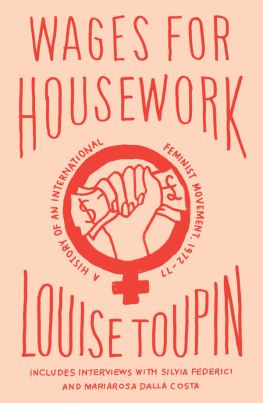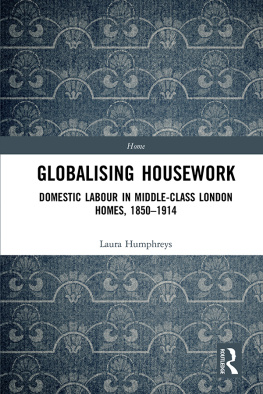Toupin - Wages for Housework
Here you can read online Toupin - Wages for Housework full text of the book (entire story) in english for free. Download pdf and epub, get meaning, cover and reviews about this ebook. publisher: University of British Columbia Press, genre: Home and family. Description of the work, (preface) as well as reviews are available. Best literature library LitArk.com created for fans of good reading and offers a wide selection of genres:
Romance novel
Science fiction
Adventure
Detective
Science
History
Home and family
Prose
Art
Politics
Computer
Non-fiction
Religion
Business
Children
Humor
Choose a favorite category and find really read worthwhile books. Enjoy immersion in the world of imagination, feel the emotions of the characters or learn something new for yourself, make an fascinating discovery.
- Book:Wages for Housework
- Author:
- Publisher:University of British Columbia Press
- Genre:
- Rating:4 / 5
- Favourites:Add to favourites
- Your mark:
- 80
- 1
- 2
- 3
- 4
- 5
Wages for Housework: summary, description and annotation
We offer to read an annotation, description, summary or preface (depends on what the author of the book "Wages for Housework" wrote himself). If you haven't found the necessary information about the book — write in the comments, we will try to find it.
Wages for Housework — read online for free the complete book (whole text) full work
Below is the text of the book, divided by pages. System saving the place of the last page read, allows you to conveniently read the book "Wages for Housework" online for free, without having to search again every time where you left off. Put a bookmark, and you can go to the page where you finished reading at any time.
Font size:
Interval:
Bookmark:

Wages for Housework
Housework
A History of an International
Feminist Movement, 197277
Louise Toupin
Translated by Kthe Roth

To the memory of my mother and my aunts,
housewives for whom a salary would no doubt
have enabled them to imagine their life differently.
A Political and Personal History
Our place in any history of the womens movement, or of anti-capitalist struggle in general, is already assured. Any article written in the past couple of years about the womens movement has had to deal with Wages for Housework, even where that treatment has been critical ... We represent an attempt to build a new womens movement, organized internationally, around a perspective that has revolutionary implications for the entire anti-capitalist struggle. What we do with this perspective how we develop it and how we organize around it should now be our principle concern.
Montreal Power of Women Collective, April 1975
You should title your book The Desaparecidos of the Feminist Movement.
Mariarosa Dalla Costa, 1994
This book is about a subject that has fallen off the radar screen of contemporary feminism, a movement born at the very beginning of second-wave Western feminism. It was called Wages for Housework or, depending on the country, salaire au travail mnager, salario al lavoro domestico, or Lohn fr Hausarbeit. In this book, I shed light on this movement, through its writings and its struggles, from its origin in 1972, when the International Feminist Collective (IFC) was formed, to its apogee in 1977, after which certain components of the IFC continued their activities under other names.
The ideas and action strategies of this current of feminism, expressed in a pioneering essay by Mariarosa Dalla Costa, Women and the Subversion of Community, covered much more than the group of material tasks commonly listed under the label housework or domestic work, and were deployed well beyond the objective of obtaining a salary for such work.defining the place of women in social organization and the gendered division of labour. This feminist current raised the issue of social reproduction and womens place within it.
Having housework recognized as real and, moreover, exploited work constituted one of the most important theoretical concerns for early thinkers of second-wave feminism. The question gave rise to a proliferation of analyses and debates on all sides. However, the idea of basing womens struggle on the specific question of housework and campaigning to demand pay for that work fell to Wages for Housework groups.
Surprisingly, despite the turmoil raised by this debate, both in the academic world and among militant feminists in the 1970s and early 1980s, barely a trace of the issue can be found today. And it is even more difficult to dig up evidence of the current that initiated it. It is almost completely ignored in university curricula, and few historiographic accounts mention its existence. Its contribution to the critique and the deconstruction of the concept of labour is no longer mentioned at all in assessments or reviews of documentation of the topic. It has reached the point that the very theme of domestic work draws almost no interest from scholars.
This current of thought, which was also an activist movement, was intended to be transnational a first for second-wave feminism. Starting in 1972, it included groups active in Italy, England, the United States, English-speaking Canada, Switzerland, and Germany. Some called it the embryo of a Womens Internationale.
The network also included a wide variety of activists something unusual at the time. The spectrum of thought was broad enough to accommodate not only white heterosexual women but also lesbians, racialized women, women on social assistance, and workers of all sorts (waitresses [as they were then known], nurses, hospital employees, and even prostitutes [as they were then known]); some were able to form their own groups, on their own premises, within the network, and to develop very original and striking analyses from their respective stances. In some countries, mens study groups were even developed in this perspective. These groups, of different sizes, were active on various fronts in their own countries: invisible aspects of family work and salaried womens work, but also abortion, medical practices, sterilization, childbirth conditions, womens health, sexuality, social assistance, family allowances, housing conditions, education, family violence, prostitution/sex work, and more.
In each of these struggles, activists developed connections with womens invisible and free labour. The struggles around housework and family work were extended into other aspects of social reproduction, which also became fields of application for the idea of wages for housework. We saw the fragmented life of women as a totality for the first time, said one of the activists I interviewed. Unpaid housework constituted a prism through which the multiple facets of womens lack of power over their lives in society as a whole could be seen, understood, and reassembled. The vast majority of women were not paid for all the work they did, and were permanently available to serve their family: this was the lowest common denominator of all women in capitalist societies, although it was experienced quite differently depending on the class, ethnicity, and race to which the person in that position belonged. Their work was that of production and reproduction of labour power, according to the definition formulated by the Wages for Housework current at the time.
Although many women and womens groups agreed with much of the analysis formulated by Wages for Housework theoreticians, few of them were prepared to undertake a campaign to demand such wages. In fact, this demand provoked heated debate in the womens movement everywhere it was discussed; one might say, without exaggerating, that the issue affected all of militant feminism in the 1970s in North-America and Europe to some degree.
The womens movement as a whole, however, rejected the Wages for Housework strategy. It was seen as a step backward in the demand for womens equality rather than one of its essential conditions, as was claimed by the currents instigators and activists. The womens movement saw it as a renunciation of the objective of socialization of domestic work (daycare centres, community services, and so on). In the labour field, the movement preferred to invest its efforts in womens access to the labour market, improvements to working conditions, the obtaining of parental leave, and the creation of community services to facilitate access to paid labour. The negotiation of demands concerning housework and family work was left to private arrangements between partners, or task sharing. In short, the domain of social reproduction was not the strategic choice of the womens movement; then as today, a strategy of family-job reconciliation was preferred.
Given how domestic work and family work have evolved today, we can look back and ask, Was this what we could call a winning strategy? And what are the tangible results of this strategy today? Without wanting, for anything in the world, to denigrate the enormous efforts that the womens movement devoted for several decades to establishing various measures and getting them enshrined in public policies, some of which were considered models of the genre in North America, a quick summary exposes trends that are worthy of examination.
Font size:
Interval:
Bookmark:
Similar books «Wages for Housework»
Look at similar books to Wages for Housework. We have selected literature similar in name and meaning in the hope of providing readers with more options to find new, interesting, not yet read works.
Discussion, reviews of the book Wages for Housework and just readers' own opinions. Leave your comments, write what you think about the work, its meaning or the main characters. Specify what exactly you liked and what you didn't like, and why you think so.












